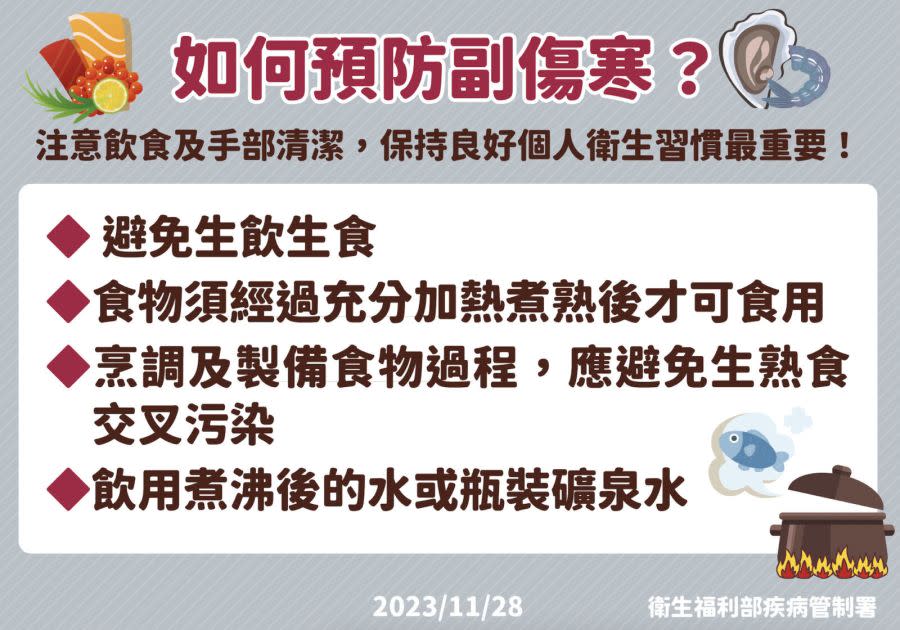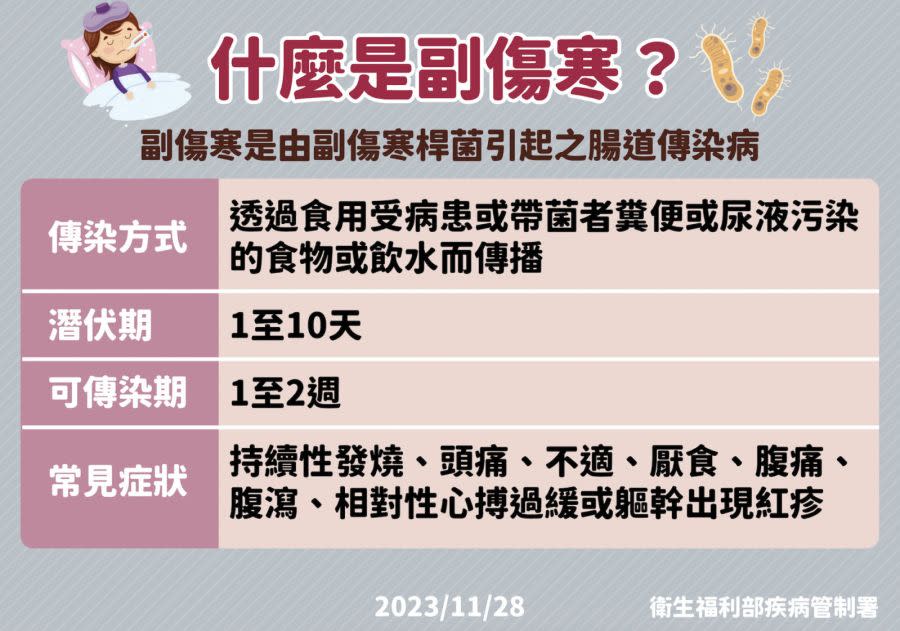CNEWS Convergence News Network reporter Chen Junkai/Reporting from Taipei
People who love eating raw seafood should be careful! The Centers for Disease Control and Prevention issued a warning today (28th) that 22 confirmed cases of local paratyphoid fever have been discovered in China since the beginning of this year, setting a new high for the same period in ten years. According to routine epidemic survey data, some cases have all been eaten raw or not. It is related to fully cooked food, such as grilled oysters, raw oysters, raw shrimps, sashimi and raw scallops, etc. It mostly occurs in fishing ports, restaurants and other places. Among them, a man in his 50s from the north died unfortunately. He was hospitalized due to a history of cancer, and the cause of death was cancer. He did not eat raw food during the two months of hospitalization, and he was diagnosed with the infection because he had diarrhea symptoms.
According to statistics from the Department of Disease Control and Prevention, as of November 27 this year, there have been a total of 23 confirmed cases of paratyphoid fever, including 22 local cases and 1 imported case from outside Indonesia.
Luo Yijun, spokesman for the CDC, pointed out that the local cases are all of local nationality, with 15 males (68%) and 7 females (32%). Their ages range from their teens to their 50s, with the majority being between 20 and 29 years old ( 50%), their residences are distributed in 11 counties and cities, and the onset times are scattered in various months, with 8 cases being the most in October.
Luo Yijun analyzed that among the cases, 5 cases had eaten roasted oysters and 2 cases had eaten raw oysters. There is a certain degree of correlation with raw food. In addition, as many as 8 cases all fell ill in October, which is a particularly concentrated situation. The disease management The Department will also conduct further genetic comparison of the collected strains.
Luo Yijun said that fortunately, all the contacts who lived or ate together had completed the test, and the test results were all negative. The current monitoring has not resulted in subsequent “human-to-human transmission”, and there have been no clusters in schools, families or workplaces. If the situation changes, the CDC will also conduct a more detailed epidemic investigation to further clarify whether there are any missed common sources of infection.
For domestic paratyphoid cases in the past, the cumulative number of local cases from 2018 to 2022 was 1, 3, 0, 1, and 6 respectively, and the number of imported cases from overseas was 7, 6, 0, 0, respectively. 0 cases, among which the infected countries of imported cases in 2018 and 2019 were Indonesia (4 cases), India (4 cases), Cambodia (2 cases), Myanmar (1 case), Bangladesh (1 case) and the United States (1 case). .
Lin Yongqing, an epidemic prevention physician of the CDC, emphasized that paratyphoid fever is a second-category notifiable infectious disease. It is an intestinal infectious disease caused by Bacillus paratyphoid. It is mainly transmitted through the consumption of food or drinking water contaminated by the feces or urine of patients or carriers. Transmission, the incubation period is usually 1 to 10 days, and the infectious period is 1 to 2 weeks. Common symptoms include persistent fever, headache, malaise, anorexia, abdominal pain, diarrhea, relative bradycardia, or rash on the trunk.
Lin Yongqing reminds the public that if you have suspected symptoms, please seek medical treatment as soon as possible and inform your dietary history. As long as proper treatment is provided, it will generally not cause serious problems. However, if medical treatment is delayed, severe cases may still develop gastrointestinal bleeding and other symptoms, and the mortality rate may be reaches 10%; the public is urged to pay attention to diet and hand hygiene at all times, and maintain good personal hygiene habits, avoid raw food and drink, food must be fully heated and cooked before consumption, and cross-contamination of raw and cooked food should also be avoided during cooking and preparation; You should drink boiled water or bottled mineral water; maintain good personal hygiene habits. You should clean your hands properly with soap and clear water before meals, after defecation, before handling food, or after changing diapers to effectively prevent it.




Photo source: CNEWS file photo/Photo by reporter Chen Junkai
“More CNEWS Convergence News Network Reports”
[Please indicate the source when reprinting the article]
#Eating #roasted #raw #oysters #big #trouble22 #people #Taiwan #infected #paratyphoid #died #record #high #ten #years
2023-11-28 06:26:02


